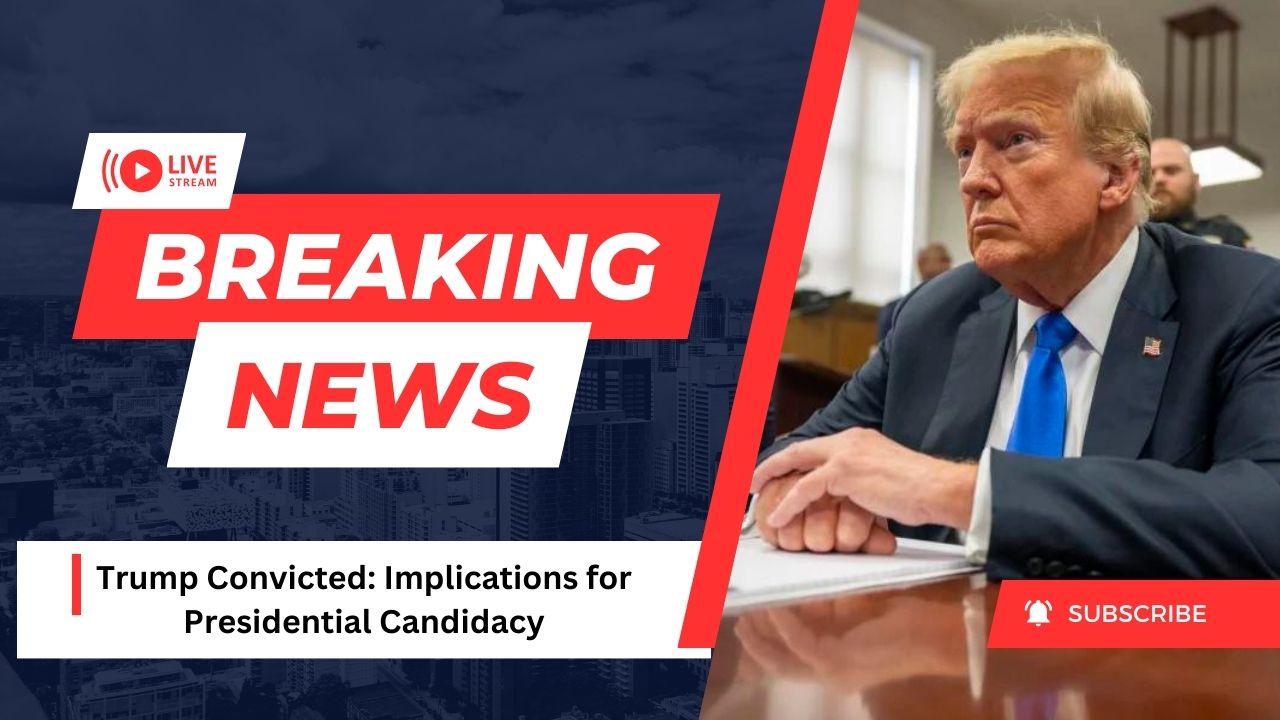Introduction

In a historic legal decision, former President Donald Trump has been found guilty on multiple charges. This development raises significant questions about his political future and the broader implications for the American legal and political systems.
Background on the Trial
The trial of Donald Trump has been a focal point of intense media scrutiny. Today, the jury reached a verdict, convicting Trump on several counts. The specifics of the charges, ranging from financial misconduct to obstruction of justice, have yet to be fully detailed in the public domain. However, the conviction itself marks a critical moment in U.S. history, as it is unprecedented for a former president to be found guilty of criminal offenses.
Details of the Conviction
Trump’s conviction encompasses various charges that were meticulously laid out during the trial. Although complete details are pending public disclosure, the gravity of the crimes — involving financial irregularities and attempts to obstruct justice — has been emphasized by the prosecution. The legal proceedings were rigorous, with both sides presenting extensive evidence and arguments.
Legal Implications
Potential Sentencing
With the conviction now confirmed, the sentencing phase is the next step in the legal process. Alvin Bragg, the prosecutor in this case, has emphasized the severity of the crimes and is expected to seek a substantial sentence. Legal experts speculate that Trump could face significant prison time, although the exact length of the sentence will be determined by the judge.
Incarceration Possibilities
The possibility of incarceration brings up the question: will Trump go to jail? While many believe that his status and influence might affect the outcome, the justice system aims to apply the law impartially, regardless of the defendant’s former position or notoriety.
Impact on Trump’s Political Future
Can a Convicted Felon Run for President?
One of the most pressing questions arising from this verdict is whether Trump can still run for president. According to U.S. law, there is no explicit prohibition preventing a convicted felon from running for or holding the office of the presidency. This legal gray area means that, theoretically, Trump could still launch a presidential campaign despite his conviction.
Public Opinion and Political Reactions
The debate extends to whether a convicted felon should be president. Critics argue that allowing a convicted individual to hold the highest office undermines the integrity of the position, while supporters claim that everyone, including felons, deserves a second chance and the opportunity to serve if elected by the people. Public opinion is deeply divided, with Trump’s loyal base viewing the conviction as politically motivated, while opponents see it as a necessary step toward accountability.
Legal Challenges and Appeals
Anticipated Legal Strategies
Trump’s legal team is likely to challenge the verdict and the implications it carries. Appeals are anticipated, which could delay any potential sentencing and further complicate the political ramifications. Trump’s lawyers are expected to argue procedural errors, bias, and other legal technicalities to overturn the conviction.
Possible Outcomes of Appeals
The appeals process could lead to a variety of outcomes, ranging from upholding the conviction to a possible retrial. Each stage of the legal battle will be crucial, as it will influence not only Trump’s personal future but also the broader political landscape as the 2024 presidential election approaches.
Broader Political Implications
Impact on the Republican Party
The conviction of a former president is a watershed moment, highlighting the accountability mechanisms within the U.S. legal system. It underscores the principle that no one is above the law, reinforcing the judiciary’s role in maintaining democratic integrity. However, the political fallout is profound. The Republican Party faces a dilemma: whether to distance itself from Trump or continue to embrace him as a central figure. This decision will significantly affect the party’s strategy and cohesion moving forward.
Voter Reactions and Electoral Impacts
As the country grapples with this historic verdict, voter reactions will play a critical role in shaping the upcoming elections. Trump’s loyal base remains steadfast, viewing the conviction as a politically motivated attack. This polarization reflects the broader divisions within American society, where legal outcomes are often interpreted through partisan lenses. The trial and conviction could energize both Trump’s supporters and his detractors, potentially increasing voter turnout and intensifying electoral battles.
Media and Public Perception
The media’s role in shaping public perception of Trump’s conviction cannot be overstated. News outlets across the political spectrum have covered the trial extensively, each with their own slant. This has contributed to a polarized media environment where the same facts are interpreted in vastly different ways. The public, in turn, is left to navigate these conflicting narratives, often reinforcing existing biases rather than fostering a unified understanding.
Comparison with Historical Precedents
Other Politicians Facing Legal Issues
Trump is not the first politician to face legal issues, though he is the first former president to be convicted. Historically, other high-profile figures have faced legal challenges, with varying impacts on their careers. The comparison with historical precedents provides context and highlights the unique nature of Trump’s situation.
Lessons from History
Historical cases show that legal troubles can either end a political career or, in some cases, galvanize a support base. Lessons from history suggest that the ultimate impact of Trump’s conviction will depend on a complex interplay of legal outcomes, public opinion, and media narratives. The unprecedented nature of a former president’s conviction means that historical analogies can only go so far in predicting future developments.
Conclusion
The trial and conviction of Donald Trump have set a precedent that will be studied and debated for years to come, shaping the narrative of American democracy in the 21st century. As the legal battles continue, the implications for the American political landscape, the rule of law, and the upcoming presidential election will remain at the forefront of national discourse. This historic moment underscores the principle that no one is above the law while highlighting the deep divisions and challenges within the American political system.
FAQs
- Can Trump appeal his conviction?
Yes, Trump can appeal his conviction. His legal team is expected to challenge the verdict on various grounds, potentially leading to a prolonged legal battle.
- What impact will Trump’s conviction have on the 2024 presidential election?
The conviction could significantly impact the 2024 presidential election, affecting voter turnout, party strategies, and public opinion. Both Trump’s supporters and detractors are likely to be highly mobilized.
- Can a convicted felon run for president in the U.S.?
Yes, U.S. law does not explicitly prohibit a convicted felon from running for or holding the office of the presidency. This legal gray area allows for the possibility of a convicted individual running for president.
- How might Trump’s conviction affect the Republican Party?
The Republican Party faces a strategic dilemma in light of Trump’s conviction. The party must decide whether to distance itself from Trump or continue to support him, which will significantly influence its future direction and cohesion.
- Will Trump go to jail following his conviction?
The possibility of incarceration is real, though the exact outcome will depend on the sentencing phase and any subsequent legal appeals. The justice system aims to apply the law impartially, regardless of the defendant’s former position or influence.










